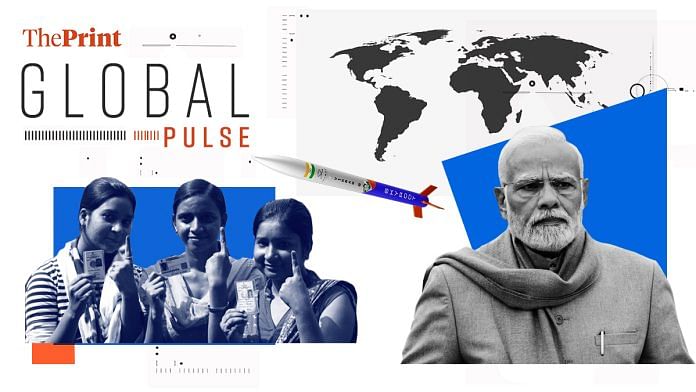New Delhi: The Economist’s ‘Even disillusioned young Indian voters favour Narendra Modi’ comments on the youth’s role in Indian elections. While it points out that only “40 percent of eligible first-time voters were registered to vote” and that some “are disappointed with what they perceive to be a lack of economic progress since the last general elections”, the article focuses on those who do not blame Prime Minister Narendra Modi and the Bharatiya Janata Party (BJP) for the low job growth in spite of expansion of the country’s economy.
“They are only slightly less likely than older people to approve of Mr Modi’s government: fully 44% of the youngest respondents (born after 1996) identified with the BJP in the CPR (Center for Policy Research) survey, compared with 48% of those born after 1980 and 52% of those born before 1980,” it says.
The article gives several reasons for why Modi is “so popular among the seemingly disillusioned young”. The BJP, it says, “has used its deep pockets and organisational heft to ensure that people around the country associate improvements in living standards with Mr Modi’s time in-charge.” Second, it notes the savviness of the party on social media, “where most youngsters consume news” and how it built relationships with influencers on Instagram and YouTube early on. The young, it reads, “appear to view Mr Modi as having done some good for the country in general”, especially its foreign policy.
It cites an Observer Research Foundation (ORF) survey, pointing out that “83% of urban Indians regarded the country’s G20 presidency, a rotational position touted by the government, as Mr Modi’s personal achievement, as an effective way of tackling India’s interests abroad”.
While job growth is a part of the BJP’s manifesto, the article concludes that “for now, young people seem willing to give the government the benefit of the doubt. Unless he delivers on jobs this time around, they may not do so again.”
In the Financial Times, South Asia Bureau Chief John Reed writes about Modi’s bid for a third term. In ‘How to understand Modi’s India’, Reed highlights the various portrayals of PM’s leadership, focusing on his portrayal as a champion of majority Hindus and an economic steward versus criticisms of democratic decline and authoritarian tendencies.
To understand these, he suggests three books, apart from the government’s own version, represented in Foreign Minister S. Jaishankar’s Why Bharat Matters.
Gujarat Under Modi by Christophe Jaffrelot explores Modi’s governance in Gujarat, focusing on his policies and practices that laid the groundwork for his national political career, including the politicisation of institutions and favouritism towards big business. Alpa Shah’s The Incarcerations delves into the state of civil liberties and freedom of expression in India under Modi’s rule, particularly through the use of “anti-terrorism and money-laundering laws to hold suspects for long periods without bail”. Kunal Purohit’s H-Pop explores various facets of Hindutva pop culture.
A video on Bloomberg highlights the government’s “holistic space policy” that inspired close to 200 start-ups. Journalist Menaka Doshi speaks to Pawan Kumar Chandana, CEO of Skyroot Aerospace — the first private company in the country to launch a rocket. According to the video, ‘Are India’s Space Ambitions Election-Proof?’, the company is targeting a satellite launch this year and with $100 million in venture funding, it aims to have one launch every month by 2026.
Chandana talks about how the space sector has always been “immune” to politics and the space budget has been “growing”. While Chandana calls recruiting and training “talent” a challenge, Bloomberg believes that despite the government’s efforts to “narrow” the gap, India is far behind the US and China. “It is going to take more than rocket science for India to get there,” it concludes.
In an article titled, ‘Indian spice makers under heat in Asia for alleged contamination’, Nikkei Asia reports on how MDH and Everest — two popular spice brands — have seen regulatory scrutiny after Hong Kong and Singapore raised concerns over alleged presence of carcinogenic elements.
Following this, Australia, New Zealand and the US, too, are “weighing investigation into the packaged spices”. Sayan Chakraborty, in this report, points out that the concerns over Indian spice brands have come “barely a year after cough syrups made in the South Asian nation were linked to the deaths of over 140 children in Africa”.
The report notes the usage of pesticides in Indian agricultural practices “often leaving traces in food products”. Referring to government estimates, the article states that “cultivated area where chemical pesticide is used grew 33.4% from the fiscal year ending March 2019 to fiscal 2023”. The report also quotes US-based food and beverage consultancy AIB International. “Poor food quality in India stems from a general lack of awareness about food safety and insufficient resources to track ingredients, among other reasons,” it says.
Also read: World’s hottest election, ‘divisive rhetoric’ by Modi & India’s digital payments revolution
ICJ ruling on Germany’s sale of arms to Israel, clearing of migrant camps in Dublin
In a case brought in by Nicaragua, the International Court of Justice (ICJ) ruled that it would not pass any emergency order to put a halt on the sale of arms by Germany to Israel. To know more about this case and its future course, read the BBC’s report.
Amid a domestic housing crisis, the Irish Prime Minister Simon Harris says no to “makeshift shantytowns”, as he clears up 200 camps to move asylum-seekers to accommodations that are safer and more sanitary. To know more, read the DW’s report report on the clearing up of Dublin migrant camps.
(Edited by Zinnia Ray Chaudhuri)
Also read: How BJP is ‘winning over’ women with ‘seva’ & trend of IITians joining political consultancies



